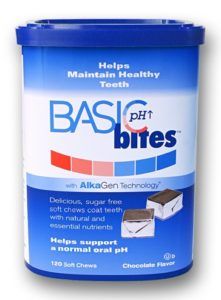Fluoride and Decay Prevention
Fluoride is a naturally occurring element that has been shown to help strengthen teeth in children and also prevent decay in people of all ages. Topical fluoride in particular is helpful for promoting oral health. The American Dental Association has publicly endorsed the use of fluoride for the prevention of dental caries, as has the American Academy of Pediatrics and the American Medical Association.

Did you know…that you might be drinking fluoride everyday without knowing it? Many communities add fluoride to the public water supply in an effort to promote better dental health. You can find out if there is fluoride in your tap water by contacting your local water utility. Keep in mind that if your primary source of drinking water is bottled, you may not be getting fluoride. You can contact your bottle water company or manufacturer to find out if fluoride is in your water. If not, speak with your dentist about getting professional fluoride treatments. |
Frequently Asked Questions
How does fluoride work?
Teeth are made from calcium and phosphate which are both positively charged. Acid is negatively charged. They neutralize when they combine. When acid from bacteria is released on the surface of your tooth, the acid is often neutralized from the calcium and phosphate from the tooth. When this happens the tooth enamel looses minerals from the tooth and a cavity is starting. Fluoride helps the tooth because it is absorbed into the surface of the tooth and repels acid attack from bacteria. In fact it is so helpful that it takes a stronger acid to cause mineral loss on a tooth.
Patients with braces or high cavity rates should consider using prescription toothpaste that has elevated levels of fluoride to make the teeth much more resistant to decay. This prescription toothpaste can be purchased at our office or a prescription can be given.
Any patient could benefit from not rinsing with water after brushing. All that is needed is to spit out the toothpaste in the mouth. The little that is left in the mouth can go a long way into helping prevent future cavities.
A lot of things from the grocery store are bad for our teeth. For instance, almost every beverage that comes bottled from the store, INCLUDING bottled water, has a ph low enough to dissolve enamel. Enamel dissolves at a pH of 5.5 and even bottled water is generally around 5.4 ph (more acidic). What should you drink? Filtered water from the tap, tap water and milk have a more basic pH and do not damage teeth.
You should look at the sugar content of other beverages as well. For example, fruit juice, despite being 100% natural has way too much sugar. You might ask, but isn’t it natural? Using apple juice as an example, when you eat an apple you don’t get all the sugar in your mouth at once. A little is released but most get released later. A glass of apple juice, on the other hand, doesn’t have the fiber locking in the sugar. All the sugar is already in the juice which gets to bathe the teeth and bacteria that use it and it like eating 8 apples at once. Since we don’t eat 8 apples all at once, it’s a bit too much sugar for us to drink all at once in a glass. From a teeth standpoint, it’s better to eat an apple than to drink it in the juice form.
Do I need fluoride treatments?
You may need fluoride treatments if your drinking water is not fluoridated or if you are experiencing certain symptoms, such as receding gums. Lee’s Summit gets water from Kansas City and Independence. The amount of fluoride as those waters are combined is about 0.6 ppm fl-. This is lower than the recommended amount of 1.0 ppm fl-. Fluoride treatments can also provide oral support and prevent decay if you wear orthodontic braces or are taking medications that cause dry mouth.
What should I expect during fluoride treatments?
Fluoride treatments are painless and can be administered in your dentist’s office at your twice-yearly check-ups and cleanings. Dr. Laudie uses a fluoride varnish that is placed directly on the teeth. This treatment only takes about a minute and is done annually on children and youth.
Is there anything I can do to supplement my fluoride treatments?
Yes. The ADA recommends supplementing your Lee’s Summit fluoridated drinking water with fluoridated toothpaste.
Basic Bites

Basic Bites are chocolate flavored chews that contain calcium and phosphate. They help the pH in the mouth become more alkaline which prevents cavity-causing bacteria to grow as well. They also help re-mineralize the enamel by providing needed calcium and phosphate. Visit www.basicbites.com for more information.
Xylitol
Xylitol is a sweetener that does not contribute to decay on enamel. It is a natural sugar found in birch trees. Mints or candies that use only xylitol as the sweetener can be helpful at preventing and controlling cavities. Talk to us about when to incorporate xylitol into your diet and how much should be used.
